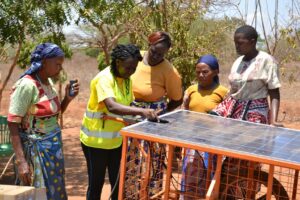Women as key actors in the decentralised renewable energy sector
Energy is the cornerstone of social and economic development, which is why SDG 7 aims to ensure universal access to affordable, reliable, and modern energy services by 2030. This goal goes hand in hand with SDG 5, which focuses on ending all forms of discrimination against women and girls. Ensuring energy access from a gender perspective will empower women, protect their rights, and help social and sustainable economic development.
In this regard, the mass deployment of decentralised renewable energy (DRE) solutions emerges as a transformative force to power communities, especially in remote and underserved regions, where women are more exposed to energy poverty. However, initiatives should not only focus on women as rights holders and consumers, but also as critical partners, development actors, experts, investors, and producers of energy.
In many developing countries, lack of access to energy is an obstacle to girls and women’s well-being and hinders their chances to improve their socio-economic status. According to WECF, it makes them even more exposed to higher levels of poverty and limits their opportunities for engaging in income generation, education, and leisure.
DRE solutions can play an important role in bridging gaps in access as they rely on small-scale, localised power generation based on clean sources. They can be tailored to the communities’ and households’ conditions to address women’s and girls’ needs. This can therefore enhance women’s livelihoods and help them access the job market, making them key actors in socio-economic development.

Drop Access
The IEA conducted a study in 2019 across 29 countries and found that, on average, there are 76% fewer women than men working in the energy sector. Women still face various challenges in accessing well-paid jobs. Efforts should be made to close this gap and enhance diversity as it is a key driver for progress. In view of this, energy transition initiatives emerge as a valuable opportunity for women to access training, develop their skills and contribute to the sector. They can bring new perspectives to the workplace and their engagement in the sector positively impacts the decision-making process, especially at the local level where they are more likely to participate in project development initiatives.
UN Women states that women can play a leadership role in promoting DRE and boosting the energy sector if climate planning and policy development are inclusive and responsive. Furthermore, part of ARE’s work also focuses on closing the gender gap and boosting policies and practices to ensure women’s participation in the sector. ARE’s publication on women entrepreneurs highlights the essential role that women play in energy access by showcasing 17 case studies and providing key recommendations for DRE companies.
Women are valuable stakeholders in the DRE sector and their involvement in programmes and activities is key to ensure sustainable socio-economic development. Efforts must continue to achieve gender equality and accomplish SDGs by 2030.
